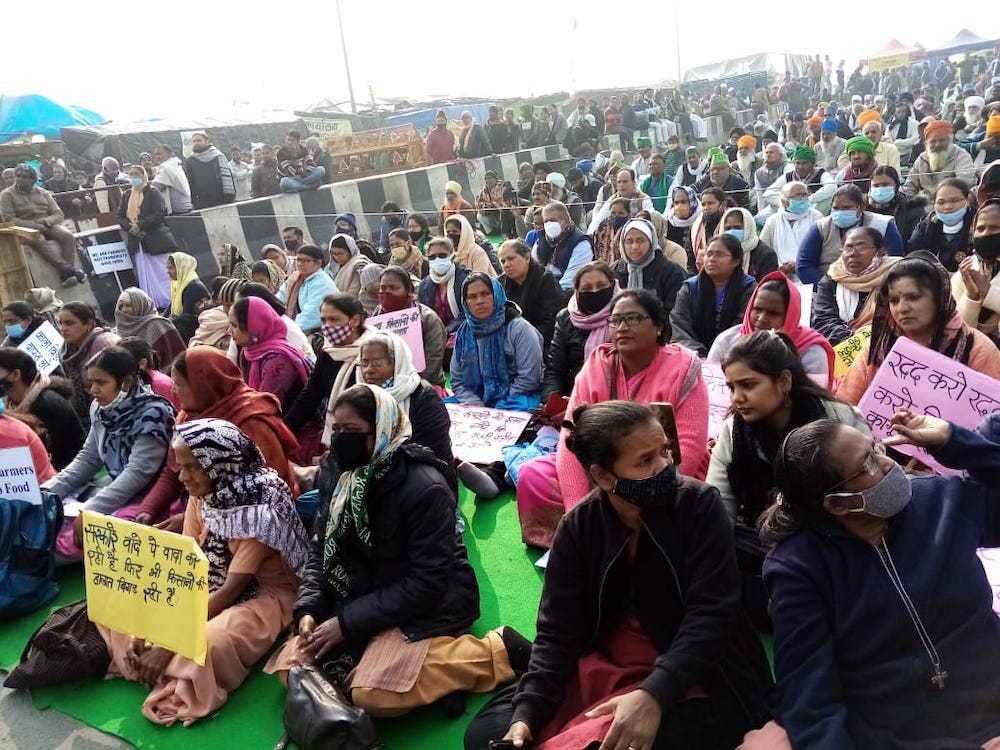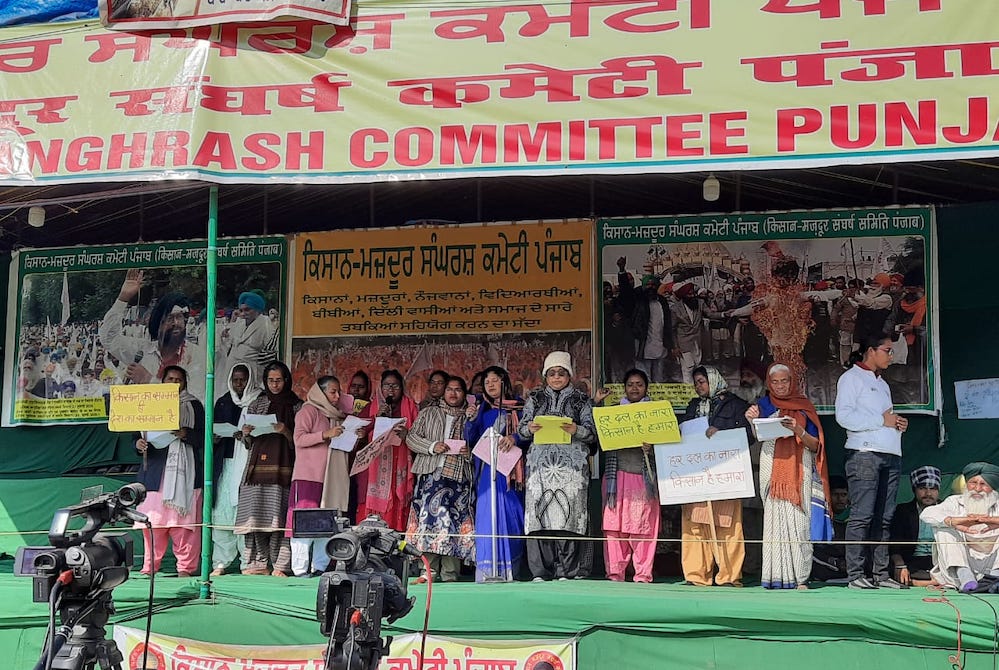
People sit in solidarity with the farmers at the Ghazipur border to India's capital city, Delhi, after new laws were passed in September. (Dorothy Fernandes)
Why are the farmers gathered together on the borders of Delhi? This is a question we need to ponder. Facing the chilling cold wind, pitching their tents with a sense of determination, not to be moved. What has compelled these farmers to make this decision? Unfortunately, there are many erroneous views making their rounds to belittle this, the greatest rally in history.
On Nov. 26, 2020, there was a nationwide general strike in support of the farmer unions, involving approximately 250 million people. On Nov. 30, it was estimated that between 200,000 and 300,000 farmers were converging at various border points on the way to Delhi.
The three borders — Singhu, Ghazipur and Tikri — have been barricaded from entry to Delhi, India's capital city. The farmers are demanding the repealing of three draconian laws, which the government is putting into force without any consultation or dialogue with the farmers.
According to India Code, section 22: "No suit, prosecution or other legal proceedings shall lie against the Central Government or the State Government, or any officer of the Central Government or the State Government or any other person in respect of anything which is in good faith done or intended to be done under this Act or of any rules or orders made there under."
Advertisement
An award-winning Indian journalist, Palagummi Sainath said
Every Indian is affected. Translated into English, the legal-lingo of these laws also convert the (low-level) executive into a judiciary. Into, in fact, judge, jury and executioner. It also magnifies the already most unjust imbalance of power between farmers and the giant corporations they will be dealing with.
And to think that Article 19 of the Indian Constitution is about freedom of speech and expression, peaceful assembly, freedom of movement, the right to form associations or unions. … The essence of Section 19 of this farm law also strikes at Article 32 of the Constitution of India, which guarantees a right to constitutional remedies (legal action). Section 32 is considered part of the basic structure of the Constitution. It also magnifies the already most unjust imbalance of power between farmers and the giant corporations they will be dealing with.
Surely the "mainstream" media (a strange term for platforms whose content excludes over 70% of the population) cannot be unaware of these implications of the new farm laws for Indian democracy. But the pursuit of profit drives them far more than any notion of public interest or democratic principles.
Against this background you can understand how we as a nation feel indebted to those who provide us with food on our table. Farmers across the country are uniting in this struggle because it means our survival.
About six of us from Bihar, Uttar Pradesh and Jharkhand states travelled some 1,000 kilometers to sit with the farmers as a mark of solidarity. It was for me a truly spiritual experience. We sat with them from 11 a.m. to 5 p.m. listening to their speeches, singing and chanting with them. There was an aura of peace, service and love reaching out in gentleness. The stage was never empty, and I felt it was a eucharistic celebration as the words came out from the depths of their being. It was breaking the word and breaking their bodies as they sat in silence braving the cold.

Presentation Sr. Dorothy Fernandes reads a statement from women religious to the farmers assembled outside Dehli, India, protesting new agricultural laws. (Provided photo)
Food was available for free and it was provided with the deepest respect; fruit was passed around. Everyone was ready to help out and no one was there to outdo the other. We were given the opportunity to express our sentiments, so I went to the stage and they announced that "the church people are here to support us."
As I spoke, I could only congratulate them for what I witnessed: a well-organized group, so disciplined. I could only thank them for taking up this struggle for all of us. For ensuring us food security and sovereignty and providing food for our table — if not for them we would be hungry. With farmers across the country united, these simple farmers have united us Indians in this historic moment and we stand by them, till the government takes back these laws.
Our farmers are very clear, they want nothing less: if laws have to be enforced, it cannot be done without the presence and contribution of the farmers. Somehow, they have to be part of the process, they have to be in the decision-making process. The government has bypassed the procedure of bringing it to the floor of both houses of parliament. Without any discussion, they wish to give the decision-making powers to the big corporations, and this cannot be. The farmers stand to lose the power to make decisions on what crops they will sow, what seeds they will use and what manure they will need for their land.
That day, Jan. 26, on the 72nd anniversary year of India becoming a republic, farmers across the country turned out in huge numbers with their tractors in peaceful protest, as a united nation. I salute all our sisters and brothers who have dared to take on the government and I pray: "Into that heaven of freedom my Father, let my country awake." Rise India, thy millions lead. A historic moment for us in our histories: Jai Jawan, Jai Kisan (Hail our soldiers, hail our farmers).







